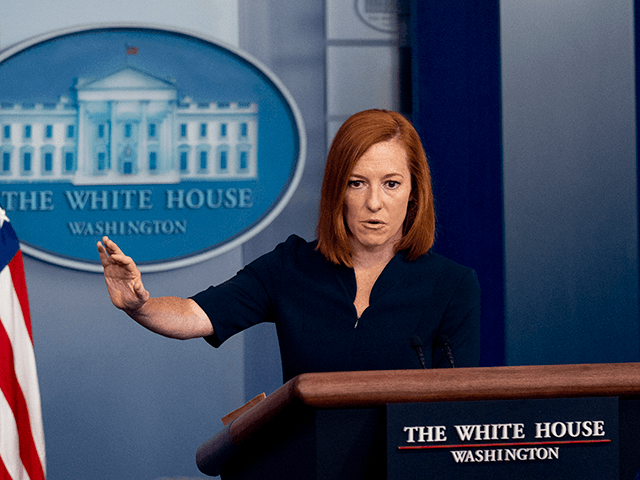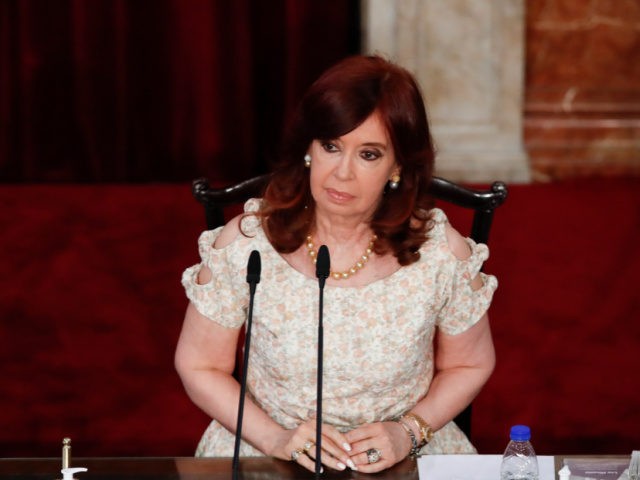Argentina’s Vice President Cristina Fernández de Kirchner reposted remarks by White House Press Secretary Jen Psaki this week claiming that soaring meat prices were the product of corporate “greed” in an apparent attempt to defend her socialist administration’s woeful economic policies.
Fernández de Kirchner served as president from 2007 to 2015, succeeding her husband, Néstor Kirchner, who began his term in 2003. Fernández de Kirchner is an avowed Marxist who used her position to bring Argentina into Cuba’s and Venezuela’s sphere of influence and establish close ties with Iran – at the expense of justice for the victims of the worst terrorist attack in the Western Hemisphere prior to September 11, 2001, the 1994 Argentine-Israeli Mutual Association bombing. Despite facing charges for having allegedly helped Iran cover up its role in the massacre, current Argentine President Alberto Fernández (no relation) put her on his ticket, winning as a result of disillusion with center-right, pro-corporate incumbent Mauricio Macri.
Fernández’s rise to power has lined up with historic inflation woes for the Argentine people, the direct result of her socialist policies. On Wednesday, however, Fernández attempted to use Psaki’s defense of President Joe Biden’s tenure – also marked by historic inflation – to defend her own handling of the problem.

White House press secretary Jen Psaki speaks at a press briefing at the White House in Washington, Friday, July 23, 2021 (AP Photo/Andrew Harnik).
“Listen to her carefully,” Fernández wrote on Twitter, referring to Psaki. “She is not Argentine, much less Peronist. She is the spokeswoman for the government of the U.S. explaining the reason for the increase in prices, especially in meat, which American consumers suffer as well. ‘The greed of the meat conglomerates’ plop!”
Fernández de Kirchner is part of the Peronist coalition, founded by Argentine dictator Juan Perón, that had for decades not committed to any particular ideology other than the adulation of Perón. Under the Kirchners, Peronism has become explicitly socialist.
The remarks Fernández quoted were a response Psaki gave to reporters regarding soaring meat prices in the United States, fueled by high inflation rates that have made the value of the dollar collapse in the past three months.
“I think that the President thinks the way people across the country, American families, digest inflation is by price increases. And if you look at industry to industry, it’s a little different,” Psaki asserted. “So, for example, the President, the Secretary of Agriculture have both spoken to what we’ve seen as the greed of meat conglomerates.”
“That is an area — one where people go to the grocery store and they’re trying to buy a pound of meat, two pounds of meat, ten pounds of meat, it is — the prices are higher,” Psaki admitted. “That is, in his view and the view of our Secretary of Agriculture, because of — you could call it ‘corporate greed.’ Sure. You could call it ‘jacking up prices during a pandemic.’”
In reality, America under Biden is facing soaring inflation unseen since at least 1982, sweeping through almost every goods market. In November, according to the U.S. Department of Labor, the U.S. consumer price index rose by 6.2 percent, a 40-year record-high year-on-year. Producer prices rose upwards of 26 percent this week, the highest number since 1974. Experts are preparing for inflation to increase, not fall, under Biden; the Atlanta Fed announced a bleak outlook this month of growing inflation in the long-term.
As dismal as economic prospects in the United States under Biden have become, Argentina is facing a much more dire inflation crisis, a perennial struggle for that nation under its various forms of Kirchner rule. A study by the research firm Focus Market found Argentina second to only Venezuela, whose socialist economy has long been a catastrophe of historic proportions, in accumulated inflation in the past six years. Argentina logged an 826-percent inflation rate during that time, compared to Venezuela’s 11.4 billion percent.
Meat prices have particularly caused Argentines strife in the past few months, as traditional Argentine diets rely heavily on beef. According to the Argentine news agency Infobae, beef prices increased 75.5 percent in November year-on-year, chicken prices increased 59 percent in the same interim, and pork prices rose 45.2 year-on-year.
Dissatisfaction with the Fernández administration led to a resounding defeat for the Argentine left in the polls last month, ending Peronist control of the Senate for the first time in 40 years. Much of the popular political energy in Argentina is not with the center-right establishment opposition, but with a libertarian coalition known as Liberty Advances, led by economist and television pundit Javier Milei.
Fernández bizarrely marked the defeat by urging leftists to “celebrate this triumph appropriately,” prompting widespread confusion and derision from Argentine media.
Follow Frances Martel on Facebook and Twitter.

COMMENTS
Please let us know if you're having issues with commenting.